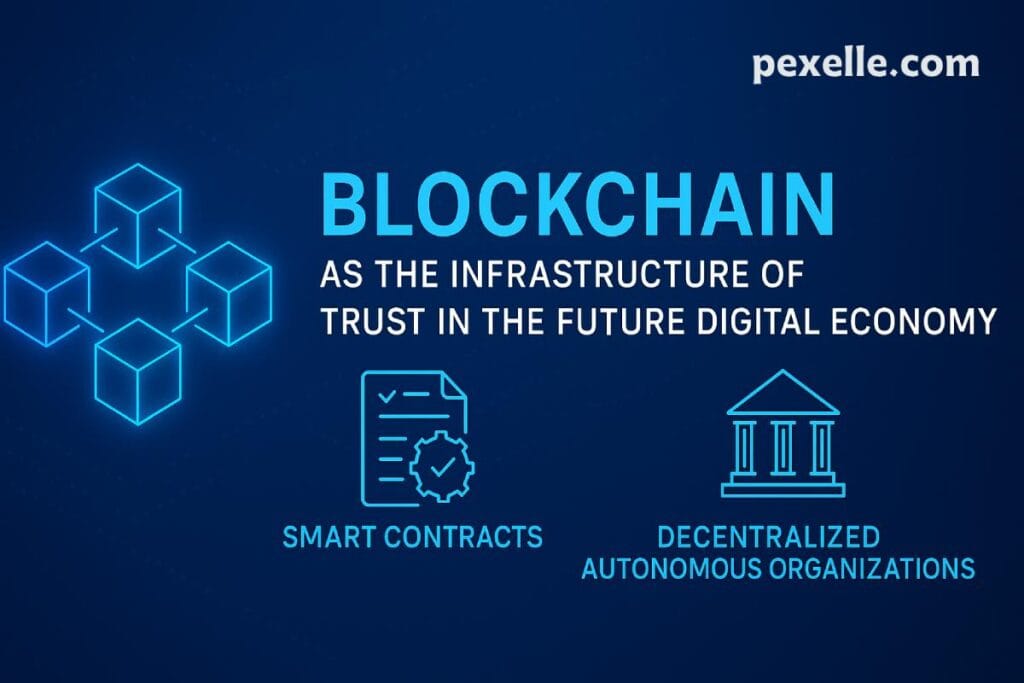Blockchain as the Infrastructure of Trust in the Future Digital Economy: From Smart Contracts to DAOs

Introduction: Reimagining Trust in a Digital World
Trust has always been a cornerstone of economic systems. Traditionally, intermediaries such as banks, governments, and legal institutions have played the role of enforcers and verifiers of trust. However, with the rise of decentralized digital technologies, blockchain is rapidly emerging as a revolutionary infrastructure that could fundamentally transform how trust is established and maintained in the economy. Rather than relying on centralized authorities, blockchain enables trust to be built into the system itself through cryptographic proof, transparency, and immutable ledgers.
This paradigm shift becomes particularly powerful when we explore two major innovations enabled by blockchain: smart contracts and decentralized autonomous organizations (DAOs). These tools extend blockchain’s potential from secure record-keeping into realms of automated governance, financial execution, and collaborative decision-making.
Smart Contracts: Code as Law
Smart contracts are self-executing agreements where the terms are written directly into code. Deployed on blockchain networks like Ethereum, these contracts automatically execute transactions or enforce rules when predefined conditions are met. This eliminates the need for intermediaries, drastically reduces transaction costs, and increases efficiency.
For example, a decentralized lending platform can use smart contracts to manage loans without a central authority. Once collateral is deposited and loan terms are agreed upon, the smart contract enforces repayments and liquidations automatically. This innovation minimizes the risk of human error or manipulation and provides a new layer of trust enforced by code.
Moreover, smart contracts can be applied in a variety of industries—from supply chain management (automating logistics tracking and payments) to insurance (automating claims processing) to real estate (handling escrow and property transfers). However, their reliability hinges on accurate data input (often through oracles) and secure coding practices, as flawed smart contracts can be exploited.
DAOs: Governance Without Hierarchies
A Decentralized Autonomous Organization (DAO) takes the principles of blockchain and smart contracts even further, offering a new model for governance and collaboration. DAOs operate as internet-native organizations with no centralized leadership. Their rules are encoded in smart contracts, and decisions are made collectively by token holders through voting mechanisms.
One of the earliest examples, The DAO, launched in 2016, raised over $150 million in Ether and was intended to operate as a decentralized venture fund. Although it was eventually hacked due to a vulnerability in its code, it marked a pivotal moment in DAO development. Today, more secure and sophisticated DAOs such as MakerDAO, Uniswap, and Aragon are shaping the future of decentralized finance (DeFi), project governance, and even digital nation-building.
DAOs represent a radical shift from hierarchical structures to flat, consensus-driven systems. They enable global participation, align incentives through tokenomics, and can operate autonomously 24/7. Nevertheless, challenges such as voter apathy, governance capture, and regulatory uncertainty remain significant obstacles to their broader adoption.
Challenges and Limitations
While the potential of blockchain to serve as a trust layer is immense, several limitations must be addressed:
- Scalability: Most blockchains still face performance issues, with limited transactions per second compared to centralized databases.
- Security: Exploits in smart contracts and vulnerabilities in DAO structures can lead to significant financial loss.
- Regulatory Landscape: As blockchain systems operate outside traditional legal frameworks, governments and institutions struggle with how to regulate them effectively without stifling innovation.
- Accessibility and Complexity: The technical nature of blockchain and governance protocols can limit participation to technically skilled individuals, raising concerns about inclusivity.
Despite these challenges, continuous improvements such as Layer 2 scaling solutions, formal verification of smart contracts, and legal frameworks for DAOs are paving the way for more robust and trusted blockchain ecosystems.
Conclusion: Toward a Trustless Yet Trustworthy Economy
Blockchain technology redefines the very foundation of trust in digital transactions—not by removing trust altogether, but by distributing and encoding it into transparent, immutable systems. Through innovations like smart contracts and DAOs, blockchain is not merely a tool for financial disruption; it is a framework for building decentralized, self-enforcing, and trustworthy digital institutions.
As society increasingly shifts toward online interactions and digital economies, the demand for secure, autonomous, and fair systems will only grow. Blockchain, as an infrastructure of trust, holds the potential to meet this demand—transforming industries, governance, and the very nature of human collaboration.
Source : Medium.com




